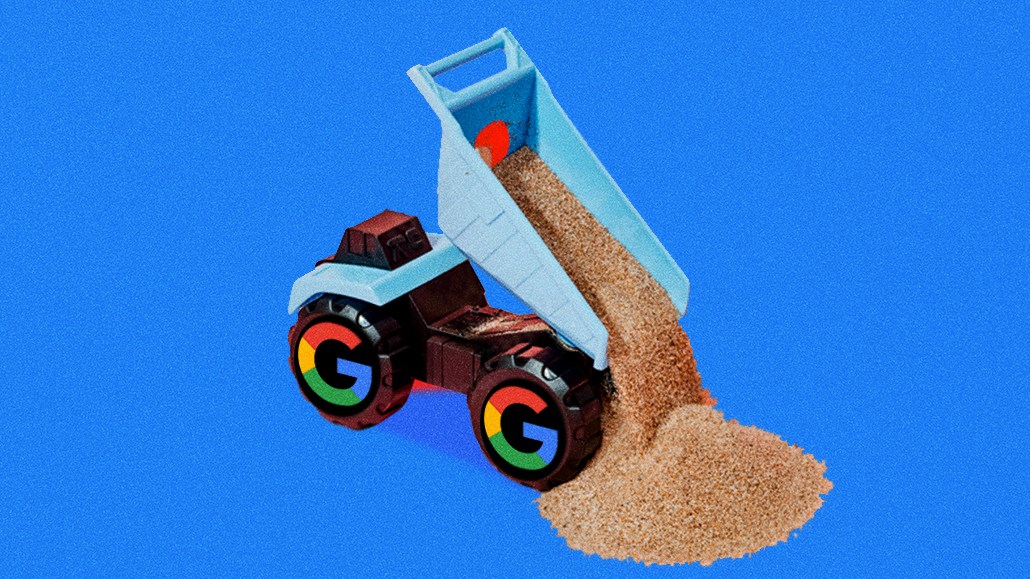Secure your place at the Digiday Media Buying Summit in Nashville, March 2-4
‘It will happen when it happens’: Google’s Privacy Sandbox continues in limbo

Critics were quick to round on Google following the publication of its latest Privacy Sandbox report, with hard-hitting punditry highlighting concessions around its flaws.
The quarterly report — which Google is obligated to publish, per the U.K.’s Competition Markets Authority requirements — acknowledged functionality challenges, particularly with its attribution reporting API.
Of course, vocal Privacy Sandbox critics, such as Movement for an Open Web and The Trade Desk, were quick to offer their thoughts, with the former labeling the report “yet another nail in the coffin.”
Many have pulled Privacy Sandbox investment, especially since Google Chrome announced its intention to postpone its policy decision on third-party cookies. That’s not to say it has been completely abandoned, with some of the most active Sandbox participants, i.e., BidSwitch, Index Exchange and Raptive, taking to the Marketecture Live stage earlier this week to share insights.
Challenges and opportunities around scale
In fact, Criteo-owned BidSwitch — a company that works with both demand- and supply-side platforms to facilitate online ad auctions — is exploring a “Privacy Sandbox service” for firms lacking the necessary funds to create infrastructure.
“We saw this opportunity to build middleware infrastructure for the Protected Audiences API (PAPI) on their behalf,” said Barry Adams, Criteo evp and BidSwitch GM. “They can then plug into this infrastructure and drastically reduce their investment and workload while still effectively bid into the Protected Audiences environment.”
Meanwhile, BidSwitch’s Matt Davies told conference attendees that Privacy Sandbox works but has many challenges, primarily due to a lack of technology adoption. “It’s hard to commit fully until they know the timelines,” he added. “It leads to low levels of publisher adoption, low levels of interest groups, and there’s still only test [advertiser] campaign budgets at this time.”
Davies further detailed how Privacy Sandbox is “built on a 1:1 infrastructure, whereas ad tech isn’t,” explaining how the current system is primarily “designed for buyers and sellers.” However, the intricacies of ad tech mean the ecosystem has evolved to include multiple third parties in most online ad trades.
Furthermore, the fact that BidSwitch doesn’t directly run online ad auctions makes it difficult for the Criteo-owned outfit to align the requisite datasets for DSPs and SSPs. “Hence, there’s a lot of third-party reporting … and it’s hard to process data in real time,” added Davies.
‘Sort of prioritizing it’
Jon King, evp of revenue at Raptive, also acknowledged that Privacy Sandbox developments have decelerated in the past 12 months given Google’s shifts in priorities. He further explained the reticence among publishers to experiment with Privacy Sandbox, with short-term revenues goals seemingly an encumbrance.
For example, if a publisher chooses to monetize an ad impression via alternative ad tech, such as header bidding, dozens, if hot hundreds, of advertisers are offered the ability to bid on it. “The PAPI world is different; one [ad impression] equals one [opportunity for a buyer],” said King. “We [as an industry] are kind of conflicted … we’re sort of prioritizing it.”
Meanwhile, Index Exchange’s chief architect Josh Prismon said increased support for monetizing video ad formats would further buoy publisher participation within Privacy Sandbox, adding that latency is also an issue.
“Another solution and one that we’re talking a lot about is enabling server-side solutions for both the DSPs and the SSPs,” he said. “That’s a really important piece.”
So, it would appear that the industry is in a chicken-and-egg situation regarding investment in Google’s Privacy Sandbox. Many await clarification from the online ad giant over its “third-party cookie consent box” before they invest further.
Digiday sources believed it would be unveiled at the IAB’s ALM meeting in January, but those hopes were dashed. Indeed, such questions were regularly leveled at Google employees who attended the March 17 Marketecture conference.
To that end, one (unnamed) Google representative was overheard to respond, “At this point, it will happen when it happens.”
More in Media Buying

Future of TV Briefing: CTV identity matches are usually wrong
This week’s Future of TV Briefing looks at a Truthset study showing the error rate for matches between IP and deterministic IDs like email addresses can exceed 84%.

Canadian indie Salt XC expands its U.S. presence with purchase of Craft & Commerce
Less than a year after buying Nectar First, an AI-driven specialist, Salt XC has expanded its full-service media offerings with the purchase of Craft and Commerce.

Ad Tech Briefing: Publishers are turning to AI-powered mathmen, but can it trump political machinations?
New ad verification and measurement techniques will have to turnover the ‘i just don’t want to get fired’ mindset.









